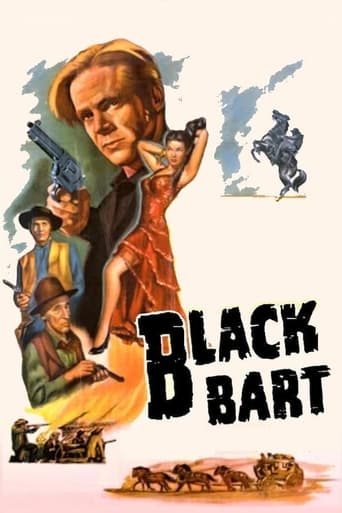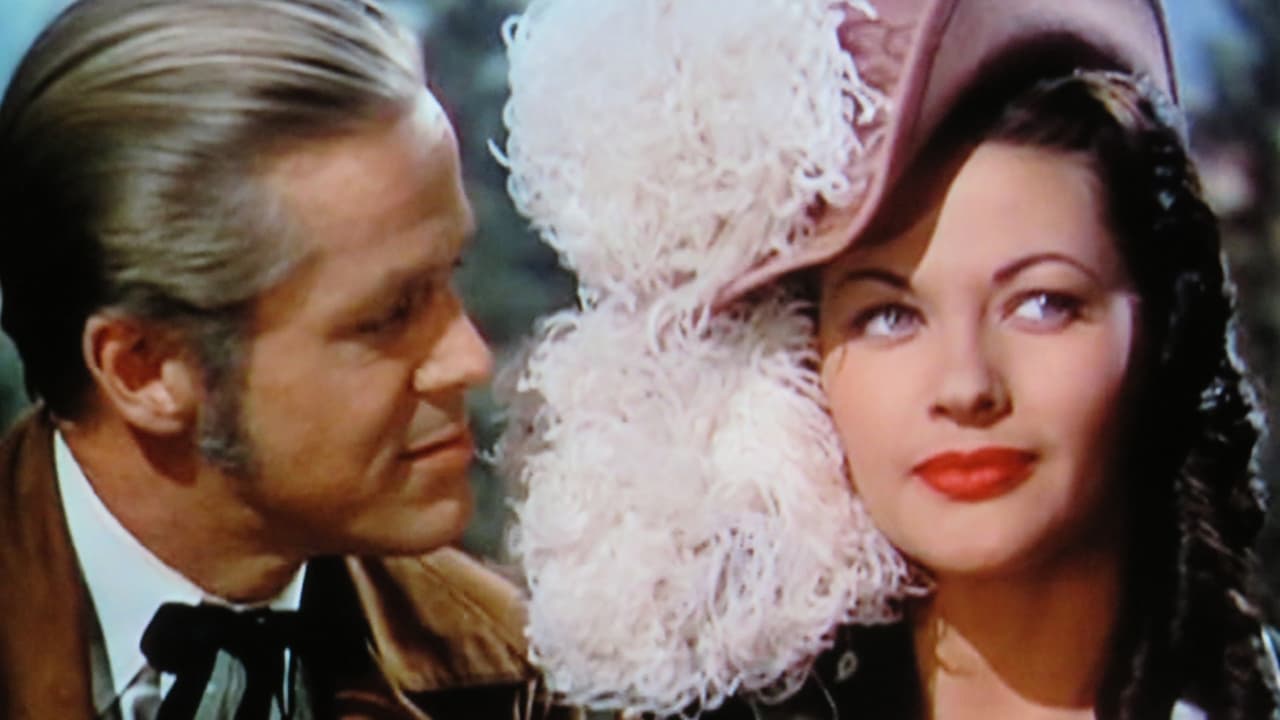JohnHowardReid
Copyright 24 March 1948 by Universal Pictures Co., Inc. New York opening at the Winter Garden: 3 May 1948. U.S. release: April 1948. U.K. release through Eros (the film was turned down by Rank): floating from November 1949. Australian release: 12 August 1948. 7,247 feet. 80 minutes. U.K. release title: BLACK BART, HIGHWAYMAN.SYNOPSIS: This film is based on the adventures of Charles E. Bolton, poet-highwayman who committed 28 hold-ups before he was apprehended, and Lola Montez, the internationally famous dancer. That they ever did meet is not impossible but highly improbable, for Lola was touring the U.S. under the direction of P. T. Barnum at the time Black Bart was on the rampage. This is a dashingly-played (particularly by Dan Duryea and lovely Yvonne De Carlo), fast-moving and very exciting melodrama, very competently directed with appealing Technicolor photography. - E.V.D.COMMENT: Quite an entertaining "B", photographed in most attractive Technicolor by Irving Glassberg, this classy Universal entry features an interesting and highly rewarding group of players, led by Yvonne De Carlo, Dan Duryea, Jeffrey Lynn and Percy Kilbride. Very capably directed by George Sherman from a taut, well-constructed and peopled-with-interesting-characters screenplay (to which William Bowers doubtless made a major contribution), Black Bart (despite its off-putting title) rates as a must-see western.
zardoz-13
Before he directed "Black Bart," George Sherman had helmed over 40 B-westerns. Despite his prolific output, Sherman challenged John Ford for artistry mastery of the genre. Nevertheless, "Black Bart" qualifies as an entertaining but formulaic tongue-in-cheek oater. Three scenarists--Luci Ward, Jack Natteford, and William Bowers—knew something about writing horse operas. Ward & Natteford collaborated together on 11 westerns, including "The Last Bandit," "Return of the Badman," Blackjack Ketchum, Desperado," and "Badman's Territory." William Bowers wrote "The Law and Jake Wade," "The Sheepman," "Support Your Local Sheriff," "The Gunfighter," and "Advance to the Rear." Ostensibly about a real life character who used the alias "Black Bart," this colorful western takes place in California and concerns a clever bandit who dresses like Zorro and skillfully wields double-barrel, sawed-off shotgun. He robs stagecoaches, and his legend spreads across the southwest much to the chagrin of the Wells Fargo Company. Unlike the remake, "Black Bart" unfolds in flashback narrated by outlaw Jersey Brady (Percy Kilbride of the "Ma & Pa Kettle" series at Universal. According to Brady, our notorious protagonists, Charles E. Boles (Dan Duryea of "Winchester 73") and Lance Hardeen (Jeffrey Lynn of "Underground") are being taken to the hanging tree by the authorities because they robbed two banks, rode out on stolen horses, and took the mayor's wife with them in the same day. Meantime, Jersey has planted explosives at the base of the tree, and he blasts the tree, gets the drop on the lawman with his rifle. Afterward, the three outlaws split up, with Boles decides to ride to California, while Lance talks about heading to Texas. Boles prefers to be done with reckless Lance. Lance was the one who brought along the mayor's wife during their twin-bill bank robbery. "You're bad news, Lance," Boles complains, "you're not interested in growing old." "There ain't no permanence in this business," Jersey observes. "Just begin to like somebody and he turns up dead." Lance points out, "You lose a lot of people you don't like that way, too." Unlike Jersey and Lance, Boles aims to make a stake and then turn respectable. Lance laughs at Boles' ambition, "You don't have a respectable bone in your body. You've got larceny pumping through your bones the same as me. You'll never make it." The three have $3-thousand buried nearby, but Lance and Jersey double-cross Boles and leave him afoot so he cannot claim his share. They ride off, while he pulls that $3-thousand wad out of his pocket. Indeed, Boles has the last laugh on Lance. Sherman makes a clever transition to California. As Boles rides into another standard-issue western town, a covered wagon passes in front of the camera, and stenciled on the canopy is Sacramento. Typically, a set of graphic titles would have been superimposed on the screen to identify the setting, but this organic introduction looks far better. Boles drifts into a bar and encounters an old friend Clark (John McIntire of "Backlash"), who invites him to sit down. Clark had been participating in a conversation with a Wells Fargo representative. Clark informs Boles that he has become a legitimate lawyer because there are no records to condemn him as a criminal. Clark concocts an audacious scheme based on the widespread discovery of gold in the state. Indeed, Clark is referring to the Sutter's Fort gold rush. Clark poses a sarcastic question to Boles:"How would you like to be in the banking business?" Multiple newspaper headlines appear about the celebrated gold rush. Afterward, we catch our first glimpse of Boles dressed up in black, riding a galloping black horse, and wearing a black bag over his face. He robs his first stagecoach. Before long, Wells Fargo has placed a $10-thousand bounty on Black Bart's head. You see, Boles and Clark have gone into business. Inevitably, Lance and Jersey show up, and they persuade the stagecoach company to hire them as drivers. Things get even livelier as dance hall girl Lola Montez (Yvonne De Carlo of "Brute Force") arrives via Wells Fargo in Sacramento. She is riding on the same coach that Lance and Jersey have taken, and they admire her diamonds worth over $100-thousand dollars. Naturally, Black Bart strikes."Bend of the River" lenser Irving Glassberg's Technicolor cinematography is vivid and some of the scenery looks imposing. The other natural beauty is not mountainous. De Carlo performs a dance number that shows a lot of leg. The dialogue is above-average and leavened with humor. Duryea makes a good outlaw, but Lynn seems distinctively out of place. Percy Kilbride serves as comic relief, and there is a surprise ending. In some ways, "Black Bart" surpasses "Ride to the Hangman's Tree." The amazing thing is that Universal Pictures was able to insert some of the action footage from this 1948 movie into the 1967 remake.
lorenellroy
Black Bart is an interesting movie and well above the norm for the standard studio product of its day.Not only is it splendidly photographed,with a lustrous use of colour that sets it apart from the herd,it has a wonderfully dry and laconic wit that adds a touch of verbal eloquence to proceedings.Indeed I was reminded at times of "Butch Cassidy and the Sundance Kid"in the banter between characters some of which would have sat well in the mouths of characters in a Philip Barry movie or other practitioners of the drawing room comedy.The script is also insouciantly epigrammatical with a pleasing sense of amorality--its leading characters are outlaws and perfectly at home with themselves and their profession.Naturally.this being a 1948 movie they are not allowed to get away with it but the morality is quite unique for the periodWe first meet Charles Bowers,later to become the title character,when he and his compadre "Lance"are about to be hung,a fact they greet with stoicism and flippant banter,when they are rescued by ex banker turned outlaw the grizzled veteran Jersey--well played by Percy Kilbride(old Pa Kettle Himself)They split up and Charles ,with the connivance of an old friend,sets himself up as Black Bart a black garbed highwayman making away with Wells Fargo bounty in a series of stagecoach robberies.Lance and Jersey re-appear,recognise him and try to cut in on the deal.Matters get complicated when Bart falls in love with Lola Montez the celebrated singer and dancer who reciprocates the feeling but insists Bart lay aside his illegal trade and turn to more legitimate pursuitsIt is a well acted movie with Duryea and Kilbride especially fine and De Carlo enters into the spirit of things with a brash and outgoing performance
Minor but interesting and I enjoyed it .Give a go -you won't regret it
Sorsimus
Can you be disappointed if you had no expectations in the first place? In this case: yes. This less than a classic western has an above average idea it fails to deliver. The triangle romance between the zorro- like masked villain, the posing- as- a- good- guy villain and the European dancer- and- mistress- to- the- emperor- of- Austria- turned- saloon singer is actually quite original.The film, however, is not. The standard western imagery and unimaginative cinematography/direction condemns this film into the "forgettable"- category. Still it must be noted that there is no hero in this western: just two outlaws and a corrupt dame. Although they get their due in the "grand" finale, themes like that are not frequent in the westerns of the classic era but associated usually to westerns in the late 60's and 70's.


 AD
AD


